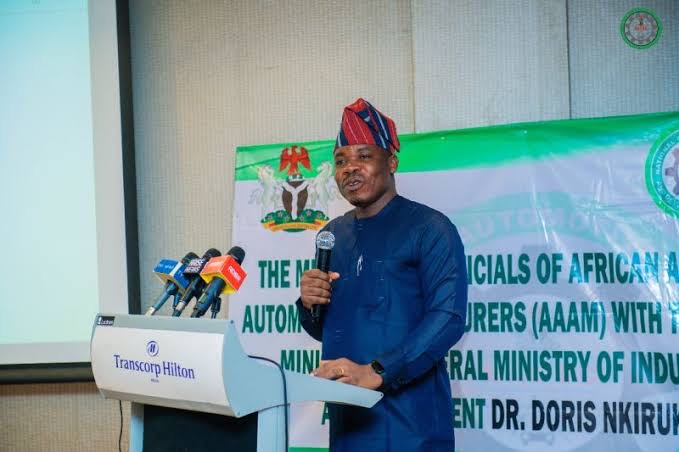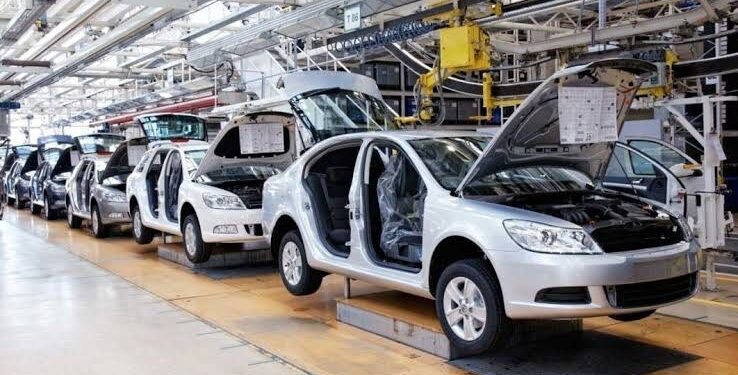The Executive Secretary of the National Automotive Design and Development Council (NADDC), Oluwemimo Joseph Osanipin, yesterday expressed concern over the reliance of Nigeria’s automotive industry on vehicle imports, saying the country cannot develop on imports.
He revealed that according to the National Bureau of Statistics (NBS), N1.47 trillion naira will be spent on the importation of passenger vehicles in 2023, a 224.67 percent increase over 2022, saying many countries are expanding their economies through the development of the automotive sector.
Osanipin was speaking in Lagos at the first Nigerian Automotive Industry Summit organized by the Nigerian Association of Automotive Journalists in collaboration with NADDC, under the theme: “Developing the Nigerian Economy through the Automotive Industry”.
He comparatively analyzed the development of the automotive industry in other countries of the world, noting that when Morocco launched its National Automotive Industry Development Programme (NAIDP) in 2013, it exported 23,000 cars, but 10 years later, it had already exported 23,000, 460,000 vehicles.

He added that Nigeria, despite having enacted an automotive policy at the same time, continues to import cars without exporting them, a trend that needs to change.
Osanipin noted that when Nigeria should have moved from semi-knocked down (SKD) to fully knocked down or fully assembled unit (FBU), Nigeria continued to move towards what he called the Dismembered Knock Down (DKD) model, which has caused it to fall behind.
He warned that the industry could be doomed if steps are not taken to turn the situation around. He said: “To this end, we must work towards a future where Nigeria is not only a consumer but also a producer of quality automobiles. In other words, let us consume what we produce and produce what we consume, in line with the President’s Renewed Hope Agenda. The good news is that several local assembly plants are operational in Nigeria and the government is more committed than ever to ensuring the industry thrives.”

According to him, South Africa and Morocco, among others, are expanding their economies through the development of their automotive sector. He complained that money spent on imports is weighing down the foreign exchange market, hindering job creation, and slowing down the economy. He said stakeholders need to work together to enable Nigeria to transform from a consumer of automotive products to one of the world’s largest producers.
“If we can produce tricycles, we should produce 90 percent of it locally. We still do DKD on tricycles. Let’s consume what we produce,” he added. Given the challenges in the automotive sector, he said NADDC would support the development of a vibrant domestic automotive industry.
“We are working on several initiatives to achieve this including the implementation of the Nigeria Automotive Industry Development Plan. The plan provides a roadmap for the growth of the industry and outlines strategies/incentives to attract investments, develop local content, and create jobs.”
“We are working with various stakeholders on training programs that will equip Nigerians with the requisite skills to succeed in the automotive industry,” he further said.
Former Acting Director General of NADDC, Lukman Mamudu, called for the expedited enactment of the NAIDP or the amended NAIDP Act for 2024-2034 to boost investor confidence.
He said, “The development of the automotive industry by domestic and foreign automotive companies will generate a large amount of employment and increased tax revenue for states. These companies generate profits from their operations and contribute to the local economy through corporate tax, income tax, levies, and other forms of taxation.”
“The automotive industry is a major employer generating direct and indirect employment opportunities. The construction of production facilities and related facilities will generate jobs in various sectors and contribute to the development and prosperity of the general economy. By 2017, NAIDP had hired more than 3,000 new employees in the industry.”
































